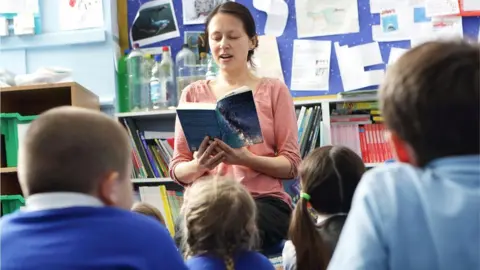Flexible school starting age a step closer in Northern Ireland
 Reuters
ReutersHundreds of children regarded as "young for their year" are set to be allowed to delay starting school in 2022.
Stormont's Education Committee has signalled its support for fast-tracking a bill to allow flexibility on school starting age.
It would allow children born between 1 April and 1 July to defer starting pre-school and school for a year if their parents wished.
Education Minister Michelle McIlveen has sought "accelerated passage".
This would allow the law to be passed before the end of the current Stormont mandate before the election in May.
Accelerated passage allows new legislation to be passed quickly as long as it has cross-community support.
The bill is still to be debated in the assembly but the committee's approval is an important step in enabling it to go forward.
'Real benefits'
A recent consultation on the plans by the Department of Education (DE) received overwhelming support.
Northern Ireland has one of the youngest primary school starting ages in Europe.
In many other European countries children do not start formal primary education until they are aged six or even seven, but most spend time in pre-school before then.
Most children in Northern Ireland start school in September of the school year after their fourth birthday.
However, children whose birthdays fall between 2 July and 31 August usually start in the September after their fifth birthday.
 Getty Images
Getty ImagesIt means children can start primary school from ages ranging from four years and two months to more than five years old.
The department's bill on school starting age allows more flexibility for children born between 1 April and 1 July, meaning they could also wait until they were aged five to begin school.
Ms McIlveen said the new laws would bring "practical workable proposals which we believe can bring real benefits for children and their families".
"Subject to the agreement of the assembly we aim to commence the new arrangements for September 2022," she said.
"Without accelerated passage it will quite simply not be possible to affect legislative change within the current mandate."
In response to a question from the Sinn Féin assembly member (MLA) Pat Sheehan, DE official Adrian Murphy said it was expected that "in the region of 300 to 400" parents would choose to wait a year for their children to start school.
Mr Sheehan also asked if the department had taken a closer look at when all children in Northern Ireland started formal education.
"There's a debate that could be had around school starting age generally," Ms McIlveen replied.
But Dr Suzanne Kingon from DE told the committee there "isn't international consensus that a later school starting age is actually beneficial to children."
"What is much more important is what children are doing in the early years and that there's a focus on high-quality play," she said.
"What is much more important I think in terms of the evidence is not when children start kindergarten or primary school but the type of learning they undertake when they're there."
Prematurely-born children
Some MLAs, though, said the new law should be extended to all children born prematurely - not just those born between 1 April and 1 July.
The committee chairman, Alliance MLA Chris Lyttle, said it was "disappointing and somewhat irregular" to revert to accelerated passage but there was "a large degree of consensus" around school starting age.
He said accelerated passage had his "qualified support."
"The bill wouldn't be passing without accelerated passage and that will involve support of all the parties," he said.
Both he and the Ulster Unionist MLA Robbie Butler said there should be a formal review and monitoring of the new legislation after it took effect.
Mr Lyttle said the committee would "work up" an amendment in relation to a formal review when the law is debated in the assembly.
